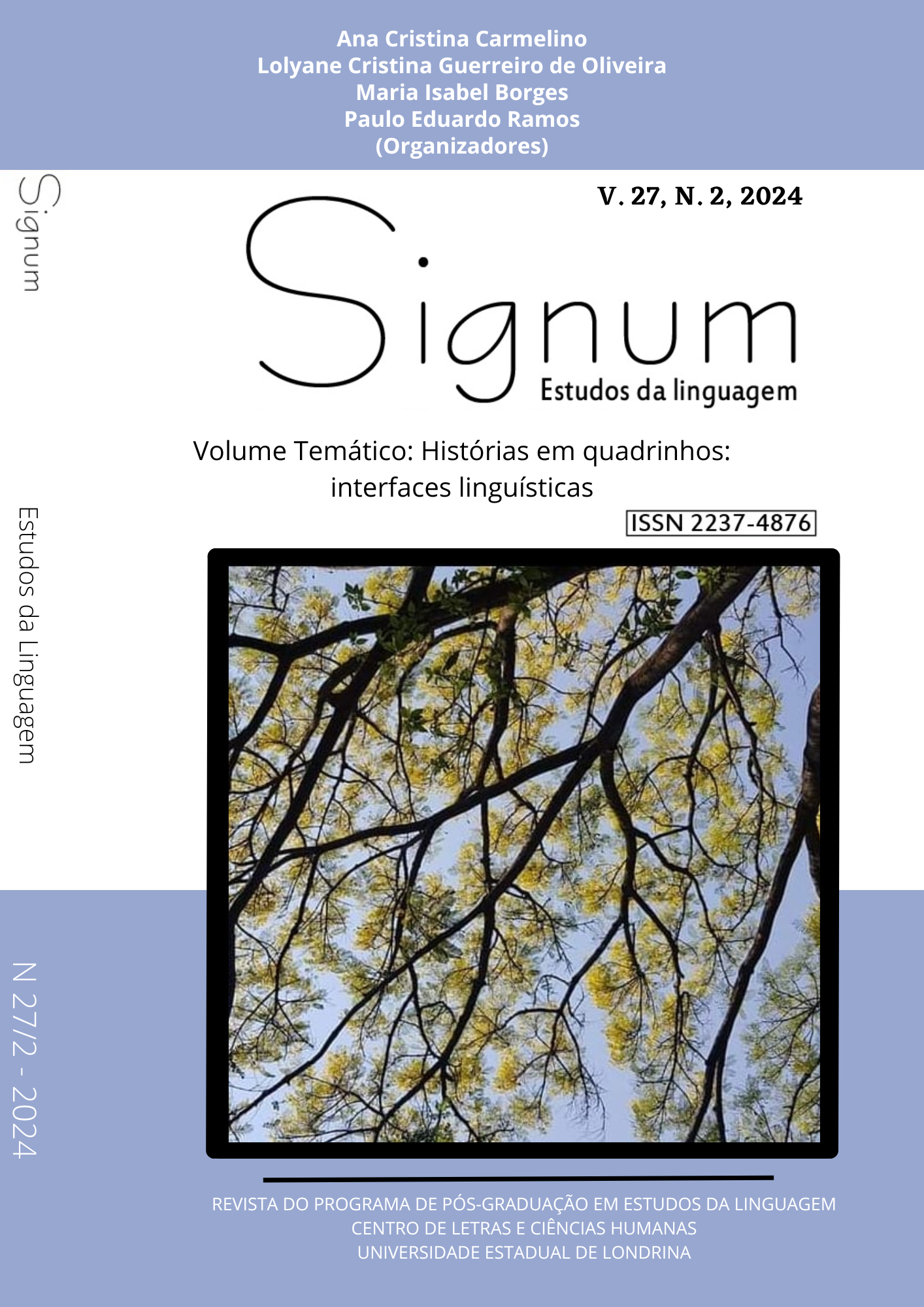Tradition and Rupture
The Representation of Women in Mafalda Comics From a Materialist Discourse Analysis Perspective
DOI:
https://doi.org/10.5433/2237-4876.2024v27n2p53-64Keywords:
Discourse Analysis, Woman, Mafalda's ComicsAbstract
This paper aims to analyze the functioning of feminist discourse in the Mafalda comic strips by the cartoonist Quino. The analysis seeks to understand how the different positions assumed by the characters Mafalda, Raquel (her mother), and Susanita (her friend) are produced. To do so, we will analyze two comic strips to describe and understand the meaning effects they produce. This work is based on the materialist Discourse Analysis, popularized in Brazil through the works of Orlandi (1999). After the analyses, we conclude that Mafalda's stance differs from the discourses of her friend Susanita and her mother Raquel. Mafalda's speeches produce effects of resistance against patriarchal practices, being influenced by the feminist movement that circulated in the 1960s in America. In Susanita's case, her positions result in an effect of resignation towards the discursive practices of patriarchy, reflecting how she behaves in relation to feminism. Meanwhile, Raquel's speeches are characterized by a discovery effect, as she becomes aware of the conflict between the social role she occupies and the positions she could have assumed socially.
Downloads
References
ALTHUSSER, Louis. Aparelhos Ideológicos do Estado. 8ª ed. Rio de Janeiro: Graal, 2003 [1970].
ALVES, Branca Moreira; PITANGUY, Jacqueline. O que é feminismo. São Paulo: Cultural/Brasiliense - Coleção Primeiros Passos, 1991.
COURTINE, J.-J. Análise do discurso político: o discurso comunista endereçado aos cristãos. São Carlos: EDUFSCar, 2009 [1981].
BEAUVOIR, Simone de. O segundo sexo: a experiência vivida. v. 2. Tradução Sérgio Milliet. Rio de Janeiro: Nova Fronteira, 1980.
BOURDIEU, Pierre. Dominação masculina. Tradução: Maria Helena Kuhner. 2ª ed. Rio de Janeiro: Berthand Brasil, 2002 [1930]. 160p.
BRETANHA, Santiago; ERNST, Aracy Graça. Contradição, discurso e resistência em análise de discurso: só há falha daquilo que causa. Cadernos de Estudos Linguísticos, v. 63, 2021.
CARRIERI, Alexandre de Pádua. O humor como estratégia discursiva de resistência: as charges do SINTTEL/MG. Organizações & Sociedade, v. 11, p. 29-48, 2004. Disponível em: https://www.scielo.br/j/osoc/a/gqQrBXSkXcytjRggN4rCQHk/?lang=pt>. Acesso em: 18 de agosto de 2023.
COSSE, Isabella. Mafalda historia social y política. - La ed. - Buenos Aires: Fondo de Cultura Económica, 2014.
CUNHA, Antônio Geraldo da. Dicionário Etimológico da Língua Portuguesa. 2. ed. Rio de Janeiro: Nova Fronteira, 1992.
INDURSKY, Freda. O trabalho discursivo do sujeito entre o memorável e a deriva. Signo y seña, n. 24, p. 91-104, 2013.
LERNER, Gerda. A criação do patriarcado: história da opressão das mulheres pelos homens. Tradução: Luiza Sellera. São Paulo: Cultrix, 2019 [1986].
MARQUES, Ângela Cristina Salgueiro; OLIVEIRA, Luciana de. Poder e Resistência: breve reflexão teórica sobre o papel do humor nos conflitos público-privado em contextos organizacionais. C-Legenda-Revista do Programa de Pós-graduação em Cinema e Audiovisual, n. 26, p. 99-110, 2012.
ORLANDI, Eni Puccinelli. Por uma teoria discursiva da resistência do sujeito. In. ORLANDI, Eni Puccinelli. Discurso em análise: sujeito, sentido, ideologia. Campinas: Pontes, 2013. p. 213-234.
ORLANDI, Eni Puccinelli. As formas do silêncio: no movimento dos sentidos. Campinas: Editora da UNICAMP, 1992.
ORLANDI, Eni Puccinelli. Análise de discurso: princípios & procedimentos. Campinas: Pontes, 1999.
ORLANDI, Eni Puccinelli. Paráfrase e polissemia: a fluidez nos limites do simbólico. Rua, v. 4, n. 1, p. 9-20, 1998. Disponível em: <https://periodicos.sbu.unicamp.br/ojs/index.php/rua/article/view/8640626>. Acesso em: 19 de outubro de 2023.
PÊCHEUX, Michel. Semântica e discurso: uma crítica à afirmação do óbvio. Traduzido por Eni Pulcinelli Orlandi. Campinas: Editora da Unicamp, 1975.
PEREIRA, Fernanda. Feminilidade e feminismo: resistência ao controle patriarcal. In: TARANI, Ana Maria de Fátima Leme et al (Org.). Poder, dizer e resistir: Ensaios em análise do discurso. São Carlos: Pedro & João Editores, 2019. 184p.
POSSENTI, Sírio. Os humores da língua. Ciência hoje, v. 30, n. 176, p. 72-74, 1998.
POSSENTI, Sírio. Humor, língua e discurso. São Paulo: Editora Contexto, 2010.
POSSENTI, Sírio. Discurso Humorístico e Representações do Feminino (Humoristic Discourse and Female Representation). Estudos da Língua (gem), v. 5, n. 1, p. 63-94, 2007. Disponível em: https://periodicos2.uesb.br/index.php/estudosdalinguagem/article/view/1048/896. Acesso em: 1 nov. 2023.
RODRIGUES, Suzana Braga; COLLINSON, David. Having fun? Humor as resistence in Brazil. Organization Studies, Berlin, v. 16, n. 5, p. 739-768, 1995.
ROUSSEAU, Jean-Jacques. Emílio ou Da Educação. Trad. Roberto Leal Ferreira. Martins Fontes. 2ª ed. São Paulo. Martins Fontes, 1999 [1762].
SOUZA, Alan Lobo de. Quando o humor (não) é humor?: uma análise dos modos de significar a universidade pública no discurso conservador. Revista do GELNE, v. 25, n. 1, p. e31957-e31957, 2023.
Downloads
Published
How to Cite
Issue
Section
License
Copyright (c) 2024 Alan Lobo de Souza, Vanessa Alves de Araújo

This work is licensed under a Creative Commons Attribution-NonCommercial-NoDerivatives 4.0 International License.
This journal reserves the right to make, in the originals, normative, orthographic and grammatical modifications in order to maintain the standard language and the credibility of the publication. It will respect, however, the authors' style of writing. Modifications, corrections and suggestions of conceptual order will be forwarded to the authors, if necessary. In these cases, the papers, once appropriate, should be submitted to a new appreciation. The final examinations will not be forwarded to the authors. Works published become property of Signum, being its total or partial reprint subject to an explicit authorization of the journal. In all subsequent quotes the original source of publication should be mentioned, in case, in Photographic Discourse. Opinions emitted by the authors are their exclusive responsibility.
















